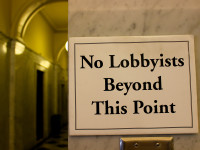The revolving door between government and lobby groups has long been a source of concern in the United States, where lead government IP officials have regularly jumped to lobby groups representing music, movies, and software interests and vice versa. In recent years, that has included the USTR official responsible for copyright in ACTA and the TPP moving the MPAA, the lead software industry lobbyist joining the USTR, and the general counsel of the Copyright Office joining the top international music association.
The Lobby Monitor reports that the revolving door has apparently migrated to Canada, with the former Director of Regulatory Affairs for Music Canada joining the government to play a key role in copyright policy, only to be replaced by the former Director of Parliamentary Affairs within the Prime Minister’s Office, who was the lead on the surprise copyright term extension for sound recordings passed in 2015.











